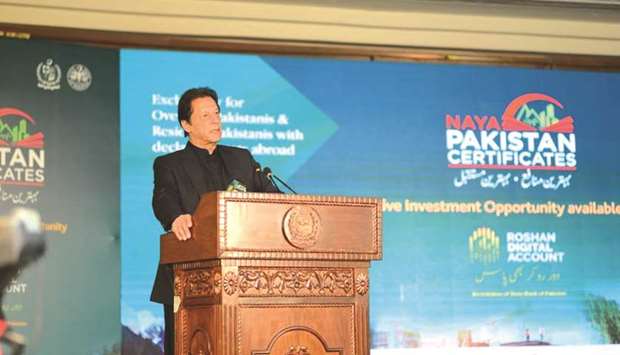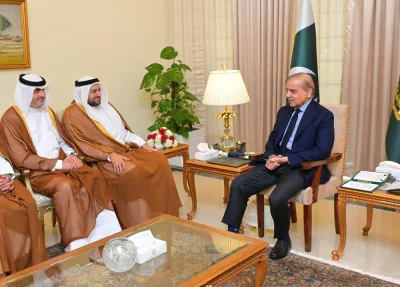Prime Minister Imran Khan launched the much anticipated Naya Pakistan Certificates for overseas Pakistanis here yesterday to incentivise investment.
The ceremony was attended by government officials, including Adviser to the Prime Minister on Finance Abdul Hafeez Sheikh, Minister for Industries Hammad Azhar and Minister for Economic Affairs Makhdoom Khusro Bakhtiar, among others.
Shariah compliant Islamic certificates would also be available for a period of 3 months to 5 years.
The depositor will be able to withdraw the capital even before the stipulated period. No tax filing will be required with only 10% holding tax applicable on net profit.
The investment in Naya Pakistan Certificate is fully refundable and no approval would be required to transfer these funds abroad.
In September, Prime Minister Imran Khan inaugurated the Roshan Digital Account, which provides innovative banking solutions for millions of non-resident Pakistanis (NRPs) seeking to undertake fund transfers, bill payments and investment activities in Pakistan.
Opening the Roshan Digital Account requires a basic set of information and documents, and only take 48 hours once all documents are complete.
The customer can choose either a foreign currency or rupee dominated account, or both. Funds in these accounts will be fully repatriable, without the need for any regulatory approval.
The PM informed the gathering that there had been no increase in the country’s debts in the past four months. Expressing satisfaction at the turnaround, he pointed out that Pakistan’s current account balance in the previous quarter had gone into surplus for the first time in 17 years. But he regretted the development “had not been highlighted” by the media.
The premier also noted that the inflow of remittances has been on the rise owing to excellent incentives by the State Bank and urged the central bank’s governor, Reza Baqir, to continue efforts to ensure that overseas Pakistanis stack their money in Pakistan.
The Naya Pakistan Certificate, the prime minister said, is an important step in this regard as it offers returns to overseas residents at a time when interest rates across the world had fallen.
He said thanks to the increase in remittances, the rupee was getting stronger and the economy stabilising “without any spending” by the government. He felt the economic situation of Pakistan would have been much better if the incumbent administration “did not have to bear the burden of past governments’ policies”.
Earlier today, the State Bank of Pakistan (SBP) data had revealed that remittances during the month of October had risen 14.1 per cent year-on-year to $2.3 billion, clocking in above the $2bn mark for the fifth consecutive month.
During July-October FY21, workers’ remittances increased to $9.4 billion, recording a growth of 26.5 per cent over the same period last year.
The SBP informed that a large part of year-on-year increase in October 2020 was sourced from Saudi Arabia (30%), United States (16%) and United Kingdom (14.6%).
The SBP noted that improvements in Pakistan’s FX market structure and its dynamics, efforts under the Pakistan Remittances Initiative (PRI) to formalise the flows and limited cross-border traveling had contributed to the growth in remittances.
Despite the Covid-19 pandemic, the workers’ remittances have managed to post strong growth. Remittances sent by overseas Pakistan increased by 31.2 per cent or $544 million to $2.283 billion in September 2020 compared to $1.74 billion received in the same month of the last fiscal year.
Since June, the country is receiving over $2 billion home remittances monthly. June saw remittances soar to $2.47 billion, while the country received highest-ever workers’ remittances — $2.76 billion — in July and $2.09 billion in August.

Prime Minister Imran Khan addressing the launching ceremony of Naya Pakistan Certificates in Islamabad yesterday.


